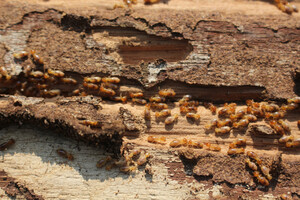
 Researchers // Professor Lousie A ASHTON, Associate Professor of the School of Biological Sciences, and her PhD students Xiaoyi ZENG and Bartosz M MAJCHER
Researchers // Professor Lousie A ASHTON, Associate Professor of the School of Biological Sciences, and her PhD students Xiaoyi ZENG and Bartosz M MAJCHERHKU Partnership // Faculty of Business and Economics
Collaborator // University of Liverpool, Natural History Museum, London, UK, Sun Yat-sen University, and University of Bristol
Termites are not just pests—they are vital for forest health. Our study found that soil invertebrates, like termites, contribute 31% of global forest leaf litter decomposition. Their impact is 1.4 times greater in tropical and subtropical regions than in forests elsewhere, thanks to warm, humid climates.

As major decomposers, termites break down organic matter and recycle nutrients, acting as ecological engineers in tropical and subtropical ecosystems. However, they are often misunderstood and targeted with insecticides, which can disrupt nutrient cycling and harm ecosystems.
The study analysed 476 cases from 93 global sites and highlighted the critical role of invertebrates, especially termites, in maintaining healthy, thriving forests. Protecting these tiny workers is essential to sustaining forest ecosystem services in the face of environmental change.
令人聞風喪膽的白蟻,其實是森林健康的重要守護者。牠們分解有機物,還促進養分循環,是不可或缺的「生態工程師」。研究顯示,土壤無脊椎動物(包括白蟻)對全球森林葉片凋落物分解的貢獻達31%,而牠們在熱帶和亞熱帶地區的貢獻比溫帶和寒帶高出1.4 倍,這很可能歸因於白蟻在熱帶和亞熱帶地區的多樣性,以及溫暖潮濕的氣候加速有機物分解,並提升養分循環的效率。
Journal paper: Global Contribution of Invertebrates to Forest Litter Decomposition (published in Ecology Letters, 2024)
| < Previous | Next > |

